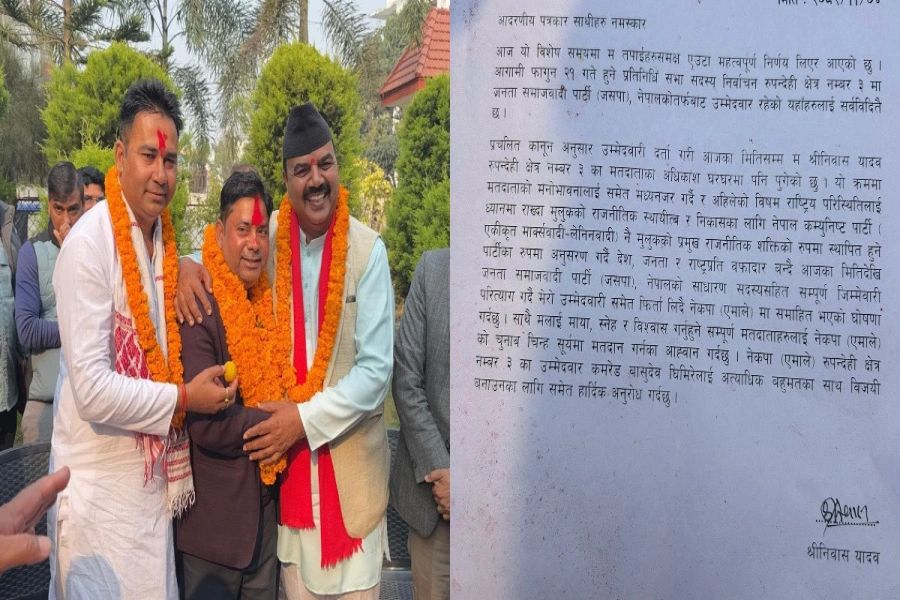Kathmandu, Aug 6: Nepal Health Research Council (NHRC) permitted 12 different hospitals to carry out convalescent plasma therapy to cure COVID-19 patients last week. The government-owned research agency green signaled after a reported recovery of a 60-year patient at Tribhuvan University Teaching Hospital (TUTH) using plasma therapy.
While the doctors at TUTH have claimed that the patient's recovery was attributed to plasma therapy, other experts rejected the claim, saying that it was "too early and premature" to make such claims. Social media is abuzz with commentaries on the issue. "Let us not project plasma therapy as a panacea. My humble request. Let us see facts," writes Yub Raj Sedhai, a critical care doctor in a hospital in Virginia, USA on his twitter on Wednesday.
A day earlier, Sedhai had tweeted, "Studies on the safety and efficacy of plasma therapy are in the preliminary stage. Even the results of the randomized trial are incomplete and short-lived. Let us not make noise."
Dr. Saugat Pouyal, a Radiation Oncologist working at the Department of Clinical Oncology, Bir Hospital, joined the fray on Twitter. "On what basis can we claim that the trial would give better and different results? The whole world is studying the subject and the result is expected to arrive only in the next one to two months. It looks the tax-payers money would go to waste," he tweeted.
A physician and researcher on health services and public health, Dr. Kiran Raj Pandey, hailed the initiative with his reservation over early excitement and premature celebrations.
Former Queen Komal Shah undergoing plasma therapy, currently on...

"We need to wait till sufficient clinical trials are made, and wait for the findings," Pandey told Republica. "Correlation is not causation," he argued, referring to the TUTH claim that the plasma therapy was the sole reason for the recovery of a serious COVID-19 patient.
However, Dr. Santakumar Das, a chest physician and coordinator of TUTH COVID-19 Management Committee, credits the success to the plasma therapy.
"This is the first case with a positive result. It is the result of a case, not a study," argues Dr. Das, who was involved in the plasma therapy treatment. "We have enough reasons to prove it."
According to Dr. Das, the 60-year old patient was administered Remdesivir for five days but there was no progress. The chest X-ray also showed a deteriorating condition.
"The patient was administered with plasma therapy rather than a ventilator, " he explained, "To our surprise, the therapy showed positive results in 12 hours with the improvement in oxygen level and pneumonia."
True to the claim of Dr. Das, convalescent plasma is a century-old passive antibody therapy that has been used to treat outbreaks of novel infectious diseases, including those affecting the respiratory system. Due to the lack of vaccines or medicine, the method is currently being used to treat the coronavirus disease. Convalescent plasma was used for SARS, MERS, Ebola, and other viral infections to improve the survival rate of patients. The therapy is done through the extraction of blood plasma from a recovered patient and then transfused into infected patients.
However, the results so far are mixed. "The therapy has contributed to reducing the level of the virus but there are not sufficient reasons to prove that it reduces the mortality rate," argued Dr. Anup Subedi, an expert on infectious disease.
"The so-called success of a single case in Nepal does not reflect the sufficient scientific evidence," added Dr. Subedi, again referring to the first plasma therapy case at TUTH.
"The patient might have recovered due to the overall treatment process, including Remdesivir, " he added, "The matter has been exaggerated."
Dr. Pradip Gyawali, member secretary of NHRC, termed the study as an "observation study" and expressed his dissatisfaction over the unwanted discussions on early success. The observation study would cover 100 patients from 12 hospitals across the country.
"We have requested the concerned doctors not to go public about the result of every case," Dr. Gyawali said. " The result should be only shared after a due research process."





































